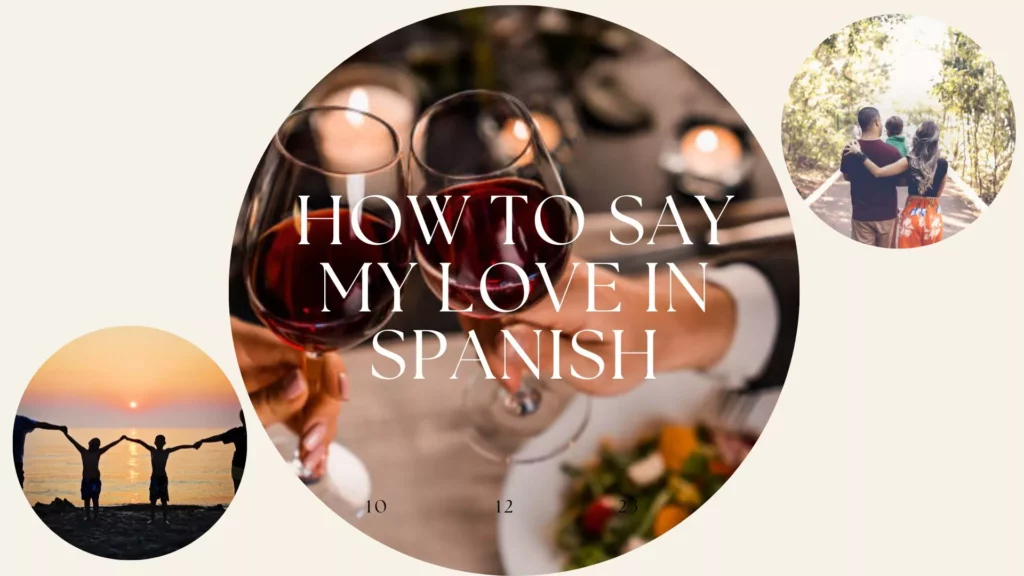How do you say my love in spanish – How do you say “my love” in Spanish? This exploration delves into the multifaceted world of expressing affection in Spanish, revealing the nuances and subtleties that transcend a easy translation.
From formal declarations to intimate whispers, this information unpacks a spread of expressions, highlighting the cultural context and variations in utilization throughout totally different Spanish-speaking areas. Uncover how the selection of phrases can dramatically alter the emotional tone and the connection dynamic, offering precious insights for anybody seeking to talk love and affection in Spanish.
Formal and Casual Expressions

Understanding the nuances of language, particularly in interpersonal communication, is essential for efficient interplay. Spanish, like many languages, provides a spectrum of expressions, starting from formal and respectful to casual and acquainted. This spectrum of ritual considerably impacts how individuals talk love and affection. This exploration delves into the subtleties of expressing “my love” in Spanish, encompassing variations throughout totally different Spanish-speaking nations and dialects.
Formal Expressions of Affection
Formal expressions are reserved for conditions requiring politeness and respect, corresponding to addressing somebody you do not know nicely or somebody considerably older than you. They emphasize politeness and ritual over emotional intimacy. These expressions are usually extra literal and fewer emotional.
| Formal Expression | English Translation | Instance Utilization |
|---|---|---|
| Mi amor | My love | “Mi amor, how are you doing at the moment?” (Used with somebody you recognize however will not be notably near, or in knowledgeable setting.) |
| Mi querido/a | My expensive | “Mi querido/a, I hope you might be nicely.” (Appropriate for a proper letter or a respectful dialog.) |
| Estimado/a | Esteemed | “Estimado/a señor/a, I hope this letter finds you nicely.” (A really formal option to begin a letter.) |
Casual Expressions of Affection
Casual expressions are utilized in shut relationships the place familiarity and intimacy are current. These expressions convey a deeper degree of emotional connection and can be utilized in numerous conditions, from intimate conversations to informal greetings.
| Casual Expression | English Translation | Instance Utilization |
|---|---|---|
| Mi amor | My love | “Mi amor, I miss you a lot!” (Used with a major different or shut buddy.) |
| Mi vida | My life | “Mi vida, you make me so joyful.” (Used with somebody you might be very near, typically in a romantic context.) |
| Mi cariño | My expensive | “Mi cariño, how are you doing?” (Used with a member of the family or shut buddy.) |
Social Context and Appropriateness
The appropriateness of formal versus casual expressions relies upon closely on the social context. A proper expression like “Mi querido/a” is appropriate in knowledgeable setting or when addressing somebody you do not know nicely. Casual expressions like “Mi amor” are extra becoming in shut relationships with mates, household, or romantic companions.
Variations Throughout Spanish-Talking Nations
Using these expressions can range barely throughout totally different Spanish-speaking nations. Whereas the core which means stays the identical, the frequency and particular utilization may differ. For instance, some nations may use sure expressions extra generally than others. Additional analysis into regional nuances could be useful.
Widespread Phrases for Expressing Love in Completely different Spanish Dialects
Completely different Spanish dialects and areas have distinctive phrases for expressing love and affection. These expressions typically replicate cultural nuances and historic influences.
- In some Latin American nations, expressions like “mi cielo” (my sky) or “mi sol” (my solar) may be frequent, including a novel poetic contact to expressing affection.
- Using diminutives, corresponding to “amorcito” (my little love) or “cariñito” (my little expensive), may be prevalent in sure dialects, highlighting the emotional intimacy.
- Exploring these expressions additional may reveal how cultural context influences the best way love is communicated in several components of the Spanish-speaking world.
Expressions Past “My Love”: How Do You Say My Love In Spanish

Past the easy “my love,” a wealthy tapestry of Spanish phrases conveys affection and endearment. Understanding these nuances permits for a extra nuanced and genuine expression of affection and intimacy. This exploration delves into the varied methods to convey affection, highlighting the refined shifts in which means and context.
Navigating the subtleties of romantic language in Spanish requires understanding not simply the literal translation, however the emotional context and cultural nuances embedded inside every phrase. This detailed breakdown offers a sensible information for selecting probably the most acceptable expression for numerous conditions.
Different Expressions of Affection
A variety of phrases can exchange “mi amor” (my love) whereas conveying comparable sentiments. These expressions range in formality and intimacy, permitting for a extra exact and expressive communication of emotions. Contemplate the extent of closeness with the recipient when choosing an appropriate various.
- Mi vida (My life): Expresses a profound sense of devotion and that the individual is central to your existence. It is typically utilized in deeply intimate relationships.
- Mi tesoro (My treasure): Emphasizes the immense worth and preciousness of the individual in your life.
- Mi cariño (My affection): A extra basic time period for affection, appropriate for expressing care and fondness in numerous relationships, from household to shut mates.
- Mi corazón (My coronary heart): Evokes a robust emotional connection and a deep look after the individual. It is ceaselessly used to precise passionate emotions.
- Mi dulce (My candy one): A extra playful and endearing time period, appropriate for intimate companions and shut mates.
Categorized Expressions of Love and Affection, How do you say my love in spanish
Expressions of affection and affection in Spanish might be categorized based mostly on the extent of intimacy and context. This categorization helps decide the suitable phrase to make use of in numerous situations.
- Informal Affection: Te quiero (I like you) is a typical option to specific affection, however there are different methods to precise care and fondness, like Te aprecio (I recognize you) or Te estimo (I esteem you).
- Romantic Affection: Te amo (I like you) is the usual declaration of romantic love. Mi amor (My love) is a typical time period used to indicate affection on this context. Expressions like Eres mi mundo (You might be my world) or Te adoro (I am keen on you) point out a stronger romantic attachment.
- Household Affection: Te quiero mucho (I like you very a lot) is used to precise love and affection to relations. Phrases like Mi hijo/a (My son/daughter), Mi hermano/a (My brother/sister), and Mi padre/madre (My father/mom) are utilized in household settings.
Desk of Expressions
| Expression | That means | Context |
|---|---|---|
| Te quiero | I like you (affectionate) | Buddies, household, shut relationships |
| Te amo | I like you (romantic) | Romantic companions |
| Mi amor | My love | Romantic companions, shut mates |
| Mi vida | My life | Deeply intimate relationships |
| Mi tesoro | My treasure | Intimate relationships, expressing immense worth |
End result Abstract
In conclusion, expressing “my love” in Spanish is way richer than a single phrase. Understanding the context, formality, and nuances of assorted expressions permits for a extra genuine and efficient communication of affection. This exploration has supplied a complete overview of methods to navigate these subtleties, making certain your expressions resonate with the supposed emotional affect.
Important Questionnaire
What are some frequent methods to say “my love” in Spanish, and the way do they differ?
There are quite a few methods to precise “my love” in Spanish, starting from formal to casual. The selection is determined by the connection and the specified emotional tone. For instance, “mi amor” is a typical, versatile choice, whereas “mi vida” (“my life”) conveys a deeper sense of devotion. A extra casual selection may be “mi cariño” (“my expensive”).
How does the extent of ritual affect the selection of expression?
Formal expressions, like “mi estimado/a,” are reserved for extra distant relationships. Casual expressions, corresponding to “mi amor” or “mi vida,” are appropriate for shut companions or relations. The suitable degree of ritual varies considerably throughout totally different Spanish-speaking nations and cultures.
Are there regional variations in how these expressions are used?
Sure, regional variations exist. Whereas “mi amor” is frequent all through the Spanish-speaking world, sure expressions may be extra prevalent in particular nations or areas. Understanding these regional nuances provides depth and cultural sensitivity to your communication.
